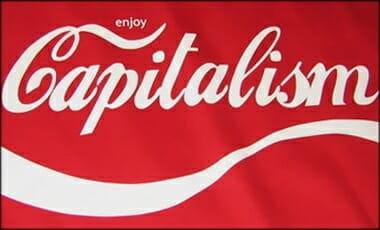Decades after capitalism seemed to have triumphed over socialism, politicians are once again arguing about the merits and drawbacks of these opposing economic systems. Why are we still having this debate? Andy Puzder, former CEO of the parent company of Hardee’s and Carl’s Jr., explains the misconceptions that keep the debate alive.
Andy Puzder


Economy – Trump’s vs. Obama’s Upward Trajectories
The new economic lie is with the sad growth of GDP during Obama’s tenure AS COMPARED to Trump’s “upward trajectory.” The IBD article Prager is reading from is entitled “Economic Boom: Media Rewrite History To Credit Obama Instead Of Trump“.
IBD:
…In fact, The New York Times itself described Obama’s economy this way in August 2016: “For three quarters in a row, the growth rate of the economy has hovered around a mere 1%. In the last quarter of 2015 and the first quarter of 2016, the economy expanded at feeble annual rates of 0.9% and 0.8%, respectively. The initial reading for the second quarter of this year, released on Friday, was a disappointing 1.2%.”
GDP growth decelerated in each of the last three quarters of 2016.
And on January 27, 2017, after the government reported that GDP growth for all 2016 was a mere 1.6% — the weakest in five years — the Times announced that “President Trump’s target for economic growth just got a little more distant.”
That same month, the nonpartisan Congressional Budget Office forecast growth this year would be just 1.9%.
There were other signs of stagnation as well. Stocks had flatlined in 2016, with major indexes down slightly. Real median household income dropped that year, according to Sentier Research.
Growth had been so worrisomely slow throughout Obama’s two terms in office that journalists started warning about “secular stagnation.” They said the country was in a period of long, sustained, slow growth resulting from slow population and productivity growth.
In August 2016, the Times declared that “the underlying reality of low growth will haunt whoever wins the White House.”
Predictions of Slow Growth
The next month, CBS News reported that “with U.S. economic growth stuck in low gear for several years, it’s leading many economists to worry that the country has entered a prolonged period where any expansion will be weaker than it has been in the past.”
In short, there was no upward trajectory to the economy on anyone’s radar when Trump took office…..
Dennis Prager poses a 64,000-dollar question to Andy Puzder, which brings clarity to the differences in the two economies when compared so far. (Puzder is an American attorney, author, and businessman… former chief executive officer of CKE Restaurants, the parent company of Hardee’s and Carl’s Jr…. previously a commercial trial lawyer in private practice from 1978 to 1995 who handled many high-profile cases and was active in the pro-life movement…. Puzder is a frequent commentator on economic and political issues.)
More Businesses Leave California ~ Carl’s Jr. (UPDATED)
This story comes from the Orange County Register and documents yet another company leaving the sunshine state:
California has changed dramatically since 1941, when Carl and Margaret Karcher scraped together about 325 bucks to start a hot dog cart in Los Angeles – a precursor to a drive-through restaurant they opened in Anaheim and which grew into the Carl’s Jr. fast-food empire. The Karchers were household names in Southern California, not just for their restaurants but for their activism in conservative politics and Catholic charities.
Whatever you think of the Karchers’ politics, you’ve got to love the entrepreneurial story that surrounds their success and what it said about California in its heyday. The Karchers – he died in 2008 and she in 2006 – came to the Land of Opportunity from the staid backwater of Upper Sandusky, Ohio.
California has beckoned many Midwesterners – and people from every part of America and the globe – not just because of its pleasant weather, but because of a culture of openness that allowed creative people to go as far as their ideas would take them. Unfortunately, people with energy and creativity are now likely to go elsewhere, to places where the state government has different attitudes toward the private sector.
Indeed, CKE Restaurants, parent of Carl’s Jr., is likely to move its headquarters from Carpinteria, near Ventura, to Texas and is undergoing a rapid expansion of restaurants in the Lone Star State. Right before the budget circus got going Wednesday, CKE CEO Andrew Puzder spoke at the California Chamber of Commerce, blocks from the Capitol dome. Like most of us, Puzder loves California and has no interest in leaving it, but he told harrowing tales about doing business in a state that has gone from an entrepreneurial heaven to a bureaucratic nightmare.
“It costs us $250,000 more to build one California restaurant than in Texas,” he said. “And once it is opened, we’re not allowed to run it.” This explains why Carl’s is opening 300 restaurants in Texas and only maintaining its presence in California. Texas has lower taxes than California, but the reason for the shift has more to do with regulation and with the attitude of the respective governments.
Puzder complained about the permitting process here, where it takes eight months to two years to open a new restaurant compared to an average of 1 1/2 months in Texas. In California, restaurants have to provide new curb cuts, new traffic lights, you name it. The company must endure so many requirements and must submit to so many inspections that it becomes excessively costly – and the bureaucrats are in charge of the project.
Once the restaurant is open, Puzder said, the store’s general managers are not allowed to run the business as if they own it. That’s the key to the company’s customer service approach – allowing general managers to do whatever it takes to make customers happy. But California’s inflexible, union-designed work rules, for instance, classify general managers as regular employees. They must be paid overtime for any work beyond an eight-hour day. They must take mandated breaks at specified times.
The Carl’s Jr. CEO notes some of his reasoning in this decision that should alert Californian’s to the problems in creating a robust economy… or in killing it:
…“It costs us $250,000 more to build one California restaurant than in Texas,” he said. “And once it is opened, we’re not allowed to run it.” This explains why Carl’s is opening 300 restaurants in Texas and only maintaining its presence in California. Texas has lower taxes than California, but the reason for the shift has more to do with regulation and with the attitude of the respective governments.
Puzder complained about the permitting process here, where it takes eight months to two years to open a new restaurant compared to an average of 1 1/2 months in Texas. In California, restaurants have to provide new curb cuts, new traffic lights, you name it. The company must endure so many requirements and must submit to so many inspections that it becomes excessively costly – and the bureaucrats are in charge of the project.
Once the restaurant is open, Puzder said, the store’s general managers are not allowed to run the business as if they own it. That’s the key to the company’s customer service approach – allowing general managers to do whatever it takes to make customers happy. But California’s inflexible, union-designed work rules, for instance, classify general managers as regular employees. They must be paid overtime for any work beyond an eight-hour day. They must take mandated breaks at specified times.
If a busload of customers comes to a store, these general managers must sit back and do nothing if they are on a break period. Most states have 40-hour workweek rules, meaning employees are paid overtime after exceeding 40 hours of work in a single week. In California it is based on the day, which limits the ability of managers to work, say, six hours one day and 10 hours the next day. Puzder complains about these industrial-era requirements that impede flexibility and harm customer service.
And California law encourages “private attorney general” lawsuits against private businesses over overtime and other regulatory rules, which has created a huge financial incentive for attorneys to file questionable legal actions against restaurants.
“It’s not like we have kids working in coal mines or women working in sweatshops,” Puzder said. It’s not as if his workers in other states, where these regulatory rules don’t exist, are oppressed, he added. “How does this help us instill entrepreneurial values?” He wonders how all these nonsensical rules teach people about being independent from the government rather than dependent on it….